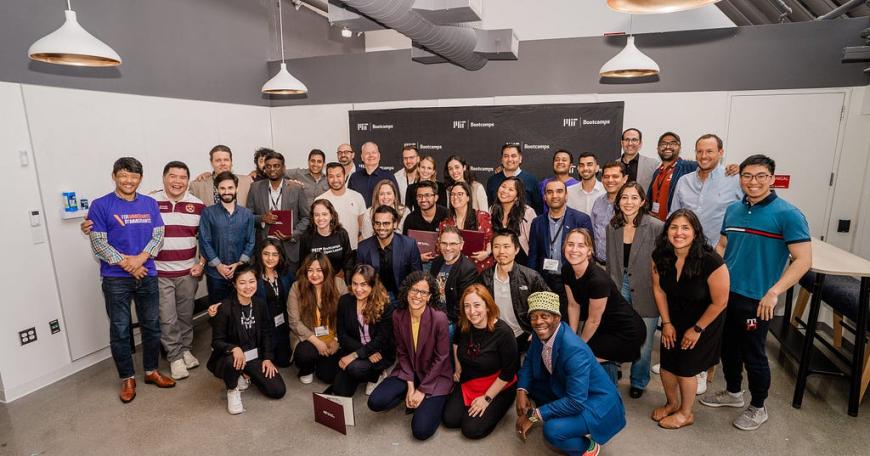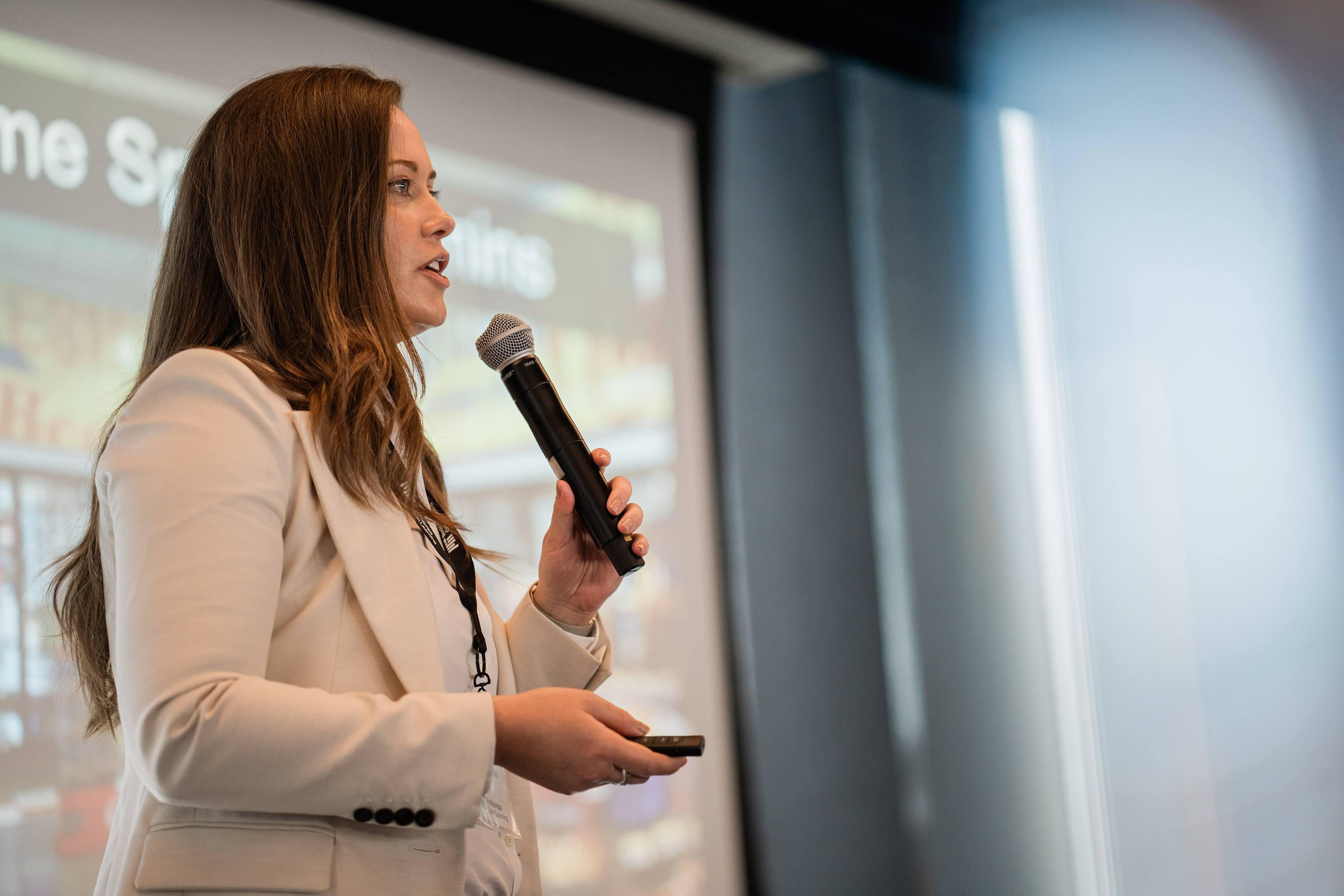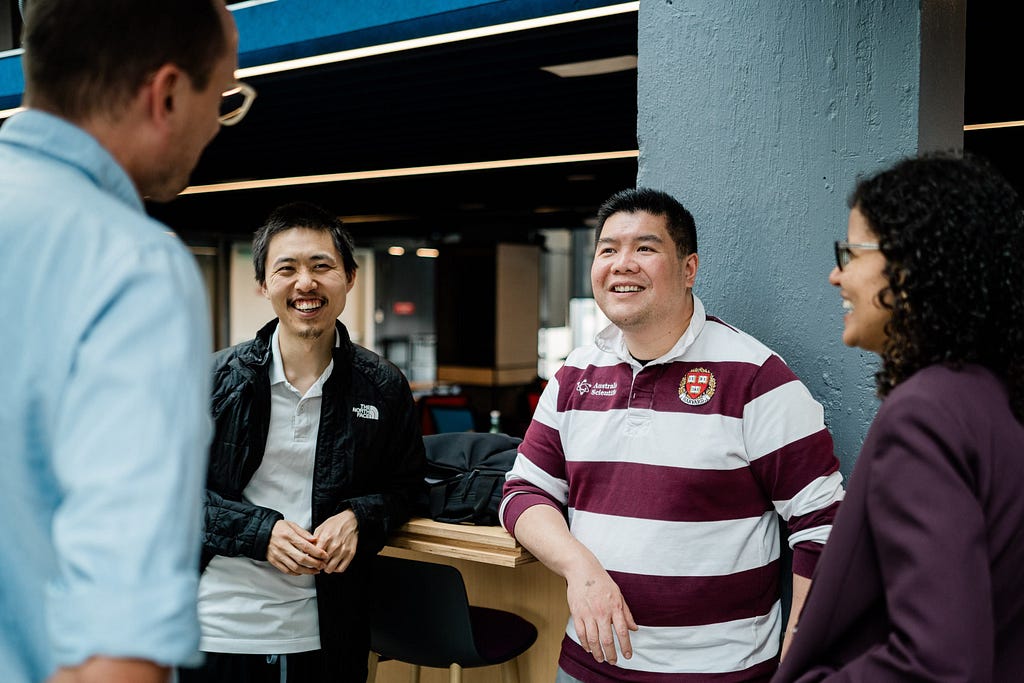
“The MIT ecosystem changes your orbit with the gravitational pull of MIT Bootcamps”
By Mariah Rawding
The Venture Advancement Program, a five-day in-person immersive educational experience by MIT Bootcamps, recently brought together 29 founders from 16 countries to MIT’s Innovation Headquarters. The program empowered these seasoned entrepreneurs from around the globe to drive sustainable innovation, equipping them with the essential skills, knowledge, and collaborative spirit needed to tackle pressing global challenges and transform their businesses into impactful, environmentally responsible ventures.
“My coaches and mentors were superb. I have continued conversations with several of them and my fellow founders, even after the in-person bootcamp,” says John Stough, who participated in the program and is the founder and chief architect at Exocubic. “There is great truth in the idea that the MIT ecosystem changes your orbit with the gravitational pull of MIT Bootcamps.”
MIT Bootcamps, part of MIT Open Learning, offers a range of programs focused on innovation and entrepreneurship, with the Venture Advancement Program uniquely designed to support existing ventures. The goal of the program is to provide an educational experience tailored to the needs of entrepreneurs building their ventures.
“Each program has a different flavor. This year, we had an overwhelming number of businesses whose focus was on solutions that promote efficient energy use, recycling, and sustainable agricultural practice, underscoring the urgency of these needs worldwide,” says Hanna Adeyema, director of MIT Bootcamps. “The program helps founders re-evaluate their problem statements, technology, and go-to-market strategies, creating a foundation for accelerated growth.”
Taking ventures to the next level

After a rigorous selection process, participants arrived at MIT eager to learn how to fundraise, refine their business plans, and gain clarity on how to navigate the challenging next steps essential for their venture’s success.
“What makes the program so powerful is that you can really get behind the text to engage directly with the depth of knowledge in a chat with that very same professor,” says Stough. He embraced opportunities to engage with his fellow entrepreneurs, faculty members, and instructors, whom he may never have had the chance to meet outside of the program.
While participants left the program with practical knowledge from MIT instructors to build their venture, they also left inspired to tackle some of the most pressing challenges society faces today, particularly in the field of sustainability.
During the final pitch competition, two of the three top pitches were centered on innovations related to agriculture and energy. Usevalad Lisouski’s pitch came in as the runner-up and Lara Christie’s pitch received an honorable mention.
Lisouski, born in Belarus and currently residing in Toronto, is building a company focused on repurposing underutilized cattle hides by turning them into quality feeding protein. Passionate about sustainability and the circular economy, he aims to help his local community, as well as the broader global environment.
“The connections established and insights gained during the program enabled me to approach the challenges within my project from different perspectives,” says Lisouski. “This experience allowed me to test my pitch in real-life scenarios and receive invaluable feedback, which has been instrumental in further refining it.”
Looking to how electric vehicles will change our future, Christie’s pitch focused on revolutionizing the traditional gas station model by integrating clean technologies, artificial intelligence, and innovative EV charging infrastructure to align with a more sustainable future.
“Participating was a pivotal experience that challenged every aspect of my business strategy, revealing blind spots and biases that could potentially derail my progress,” Christie says.
Collaborating to bring forward novel solutions

With many ventures growing in a similar space, the program was designed to encourage knowledge sharing among peers, coaches, mentors, and instructors. The need for collaboration and open communication in the entrepreneurship space emerged during multiple sessions and workshops.
Paul Cheek, executive director of the MIT Martin Trust Center for Entrepreneurship and co-founder of Oceanworks, presented a workshop on how to validate value propositions quickly in the market. During the workshop, he told students, “Stealthy is unhealthy,” referring to startups in a state of secrecy where no or limited information is available about the startup or product. He emphasized the need for testing potential new customers as early and as often as possible.
Sean Grundy, co-founder of Bevi and an MIT Sloan School of Management alumnus, shared his journey in a fireside chat. Bevi, a company dedicated to ending plastic bottle usage worldwide, owes some of its initial success to the open exchange of ideas with fellow entrepreneurs during its early stages. Grundy emphasized that transparency and collaboration were part of the reason that Bevi was able to innovate and improve early in its entrepreneurial journey.
Some participants even saw this collaborative spirit in action at the program. “I had a chance to discuss supply chain challenges of my project with a member of the cohort, who has already resolved similar problems,” Lisouski says. “This exposure directed me towards solutions that I had not previously considered.”
With a strong emphasis on sustainability and collaboration, the program highlighted ventures addressing critical global challenges, such as renewable energy, and innovative agricultural practices. Learners left equipped not only with enhanced entrepreneurial skills but also with a renewed sense of purpose and inspiration to drive impactful change in their industries and communities, together.
“The caliber of coaches and mentors — successful entrepreneurs in their own right — was phenomenal,” Christie says. “They generously shared their expertise in both group settings and one-on-one sessions, helping transform my initial concept into a robust strategy ready for the stratosphere. The program didn’t just advance my venture. It enriched my entire entrepreneurial journey.”
“The MIT ecosystem changes your orbit with the gravitational pull of MIT Bootcamps” was originally published in MIT Open Learning on Medium, where people are continuing the conversation by highlighting and responding to this story.

